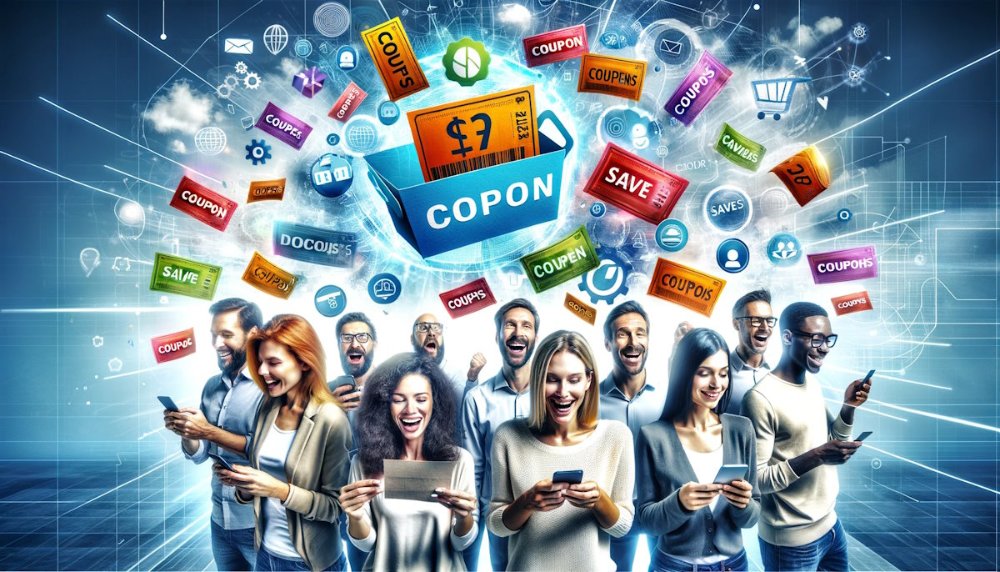In today's fast-paced world where consumers are bombarded with marketing messages and promotional offers, the humble coupon remains a powerful tool for businesses to attract and retain customers. Despite the advent of digital technologies and online shopping, the allure of coupons continues to captivate consumers, tapping into deep-rooted psychological motivations that drive their desire to save money and seek value.
This article delves into the fascinating psychology behind coupon usage, exploring the various factors that influence consumer behavior and fuel the pursuit of discounts.

The Lure of Scarcity
One of the primary psychological factors at play is the principle of scarcity. When presented with a limited-time offer or a coupon that expires, consumers experience a heightened sense of urgency and a fear of missing out (FOMO). This fear often stems from the perception that the deal is scarce and may not be available again in the future.
As a result, consumers are more likely to act quickly and redeem the coupon from online platforms such as Bountii, 28coupons.com, and others. People are driven by the desire to capitalize on the perceived value before it disappears. Marketers often leverage this principle by creating a sense of exclusivity or limited availability, which can increase the offer’s perceived value and drive higher redemption rates.
Avoiding Losses
The concept of loss aversion also plays a significant role in the psychology of coupon usage. Humans are generally more motivated by the prospect of avoiding losses than by the potential for gains.
When a coupon offers a discount or savings, consumers perceive it as an opportunity to avoid losing money. This perception of saving creates a powerful psychological incentive as individuals strive to minimize their financial losses, even if the actual savings are relatively small.
Additionally, the framing of the discount can significantly impact its perceived value. For instance, presenting a discount as a ‘50% off’ offer may be more appealing than stating the actual monetary savings as consumers tend to overvalue percentages and undervalue absolute amounts.
A Sense of Accomplishment
Using coupons can provide a sense of accomplishment and empowerment for consumers. By successfully locating and redeeming coupons, individuals feel as though they’ve outsmarted the system and gained an advantage over the retailer. This feeling of pride and satisfaction can be a potent motivator, particularly for those who derive a sense of achievement from finding and utilizing discounts effectively.
Moreover, the process of searching for and redeeming coupons can foster a sense of community and camaraderie among coupon enthusiasts who often share tips, strategies, and experiences, further reinforcing the sense of accomplishment and belonging.
The Principle of Reciprocity
Another psychological factor that contributes to coupon usage is the principle of reciprocity. When retailers or brands offer coupons, consumers may perceive it as a gesture of generosity. In response, they feel a sense of obligation or desire to reciprocate by utilizing the coupon and making a purchase. This reciprocal behavior is deeply ingrained in human nature and can influence purchasing decisions, even if the discount itself is relatively modest. (1)
Businesses can leverage this principle by presenting coupons as a token of appreciation or a reward for customer loyalty, fostering a sense of goodwill and increasing the likelihood of coupon redemption.

Social Influence and Peer Pressure
Social influence and peer pressure also play a role in the psychology of coupon usage. Consumers may be more inclined to use coupons if they witness others in their social circles doing so. The desire to conform to social norms and avoid being perceived as wasteful or extravagant can drive individuals to adopt coupon-utilizing behaviors, particularly in communities or social groups where frugality and savings are valued.
Furthermore, social media and online forums have facilitated the sharing of coupon-related information, enabling consumers to learn from and inspire one another, further reinforcing the social influence factor.
The Thrill of the Hunt
The act of using coupons can trigger a sense of accomplishment and satisfaction, which can be likened to solving a puzzle or overcoming a challenge. For some consumers, the process of searching for and successfully redeeming coupons becomes a form of entertainment or a hobby, providing a sense of intellectual stimulation and personal achievement. This thrill of the hunt can be particularly appealing for those who enjoy the challenge of finding the best deals and maximizing their savings.
Businesses can tap into this psychological driver by creating coupon campaigns that involve elements of gamification such as scavenger hunts, puzzles, or challenges to enhance the overall coupon-using experience.
Conclusion
The psychology behind using coupons is a multifaceted phenomenon that taps into various aspects of human behavior and decision-making. From the fear of missing out on scarce opportunities to the desire for accomplishment and the thrill of the hunt, coupons have a powerful psychological appeal that resonates with consumers on multiple levels.
Ultimately, the psychology of coupon usage highlights the complex interplay between rational decision-making and emotional motivations that shape our purchasing choices. As consumers, recognizing these underlying influences can help us make more informed decisions and strike a balance between seeking value and avoiding overconsumption driven by psychological biases.
Reference:
1. What is reciprocity? https://www.verywellmind.com/what-is-the-rule-of-reciprocity-2795891